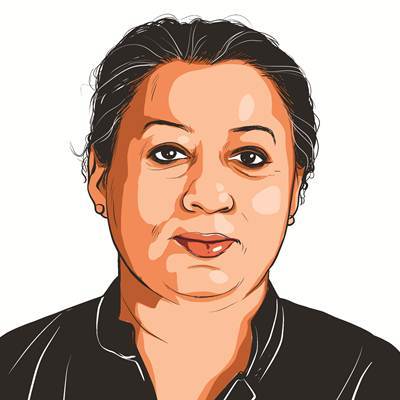Ritu Sarin is Executive Editor (News and Investigations) at The Indian Express group. Her areas of specialisation include internal security, money laundering and corruption. Sarin is one of India’s most renowned reporters and has a career in journalism of over four decades. She is a member of the International Consortium of Investigative Journalists (ICIJ) since 1999 and since early 2023, a member of its Board of Directors. She has also been a founder member of the ICIJ Network Committee (INC). She has, to begin with, alone, and later led teams which have worked on ICIJ’s Offshore Leaks, Swiss Leaks, the Pulitzer Prize winning Panama Papers, Paradise Papers, Implant Files, Fincen Files, Pandora Papers, the Uber Files and Deforestation Inc. She has conducted investigative journalism workshops and addressed investigative journalism conferences with a specialisation on collaborative journalism in several countries. ... Read More
"India’ll never loosen its grip on Kashmir"
His days of retirement interrupted a second time by that call from South Block in May, Girish Chandra Saxena, 70, again finds himself in ...

His days of retirement interrupted a second time by that call from South Block in May, Girish Chandra Saxena, 70, again finds himself in what must be one of the most picturesque residences in the country. And Srinagar’s Raj Bhavan, he admits, has its recuperative powers. During his first tenure as Governor from 1990-1993, when militancy was at its peak, Saxena would often step out for a deep whiff of the mountain air, with the Dal Lake in front of his bungalow and the Zaherwan Hills behind. Now, with the National Conference Government in place, Saxena, a former RAW chief and security advisor to Prime Minister Rajiv Gandhi, has settled down for his second and certainly more relaxed tenure. He spent two hours last week talking to RITU SARIN in Raj Bhavan. Excerpts:
How would you compare your earlier tenure as Governor with this one?
There has been a sea-change in the situation and signs of normalcy are there to see. But there are two or three things that have come in the way ofnormalcy. One is the change of season to the summer months, which are always more prone to infiltration. The second is that Pakistan has tried to escalate matters — both on the LoC as well as in the interior areas. Thirdly, many more foreign militants are coming in, maybe one-third now. When I was here last time, the number of foreign militants would be in double figures, 40-50. The number has been increasing sharply, though a fairly highpercentage has been getting killed.
How closely are developments in the Valley linked to events along the Pakistan-Afghanistan border?
As I said, the character of militancy is changing since foreign mercenaries are calling the shots. Local militants are playing a subsidiary role — as guides, giving logistical support, sanctuary and also making hits at softer targets. Territorially, the arc of militancy has extended more to the Jammu sector.
There are now confirmed reports of large-scale infiltration and dumping of huge quantities of arms. Will the nextsummer be another flash-point?
The control of infiltration is actually apprehension and killing. You cannot physically block their entry. Our success rate has been quite good. We must have killed some 650 militants this year and apprehended some 750. The volumes are far less than earlier years because there has been a fall in the number of incidents.
But Pakistan has managed to internationalise the Kashmir issue.
They are just trying to keep the pot boiling…They cannot afford to let things stabilise too much. But they are also worried: there was a time when people were scared to put a TV dish on their homes, but now you have cable operators, video-parlours and beauty parlours operating. Even illicit liquor is being sold. Basically, we are very much on top and though the gun is still around, we have an upper hand. We have withstood everything they have thrown at us.
What about the Taliban factor? Some Hurriyat leaders have even accorded a welcome to them…
It is only in Indiathat people can get away with that kind of talk. Now if you always keep booking them (Hurriyat leaders) under the law that also has its pluses and minuses and if you give them too long a rope, that also has its pluses and minuses…Basically, some of the noises which were made internationally in the wake of the nuclear explosions uplifted the sagging morale of the Hurriyat leaders…But soon the people will realise that nothing is going to happen. You will never see a loosening of India’s grip on Kashmir.
Is there a tangible threat from the Taliban?
The Taliban factor is not there per se. And we have been dealing with a sizeable number of Afghans here, who have seen war and are the Taliban types…Their training camps are the same it is only that some of them head in the direction of Mazaar-e-Sharief and some in the direction of the Valley.
So if the Talibans do come in larger numbers, it will not be a new experience for us. It is the arithmetic which will bother us. There will be morebloodshed and we will also take a few more casualties. While they may have overrun most of Afghanistan, they will be no match for the Indian Army.
You are a veteran intelligence expert. Is there any aspect of the changing ground situation that worries you?
Some heavier weapons have started coming in, mortars, a few missiles, anti-tank missiles, anti-aircraft guns (though not in very large numbers and tailored to take on just low-flying aircraft)…Then, there is a lot of sophistication in mine blasting and IEDs which are blasted by remote-control. We have been trying to perfect our systems to counter them.
…On the whole it has been a good policy on our part not to use heavier weapons, not to use tanks, APCs and aerial bombardments since they would cause more casualties and give them a lot of publicity. We do not raise the temperature beyond a point…Militancy has to be countered not just on the security front, but also the political front, the economic front, the administrative front, thepsychological front and the publicity front.
What steps has India taken to cool down the temperatures at the LoC?
We are taking various steps: some bunkers are being built for civilians…otherwise, in the open, the people may be running not away from a shell but towards the next hit. We are also trying to get a good idea of the locations from where the firing is coming. Secondly, we now have alternative routes and detours on the most vulnerable roads and passages so that the movement of convoys and things does not get restricted.
Which side had the edge during this year’s intensive border firing?
Ours was generally a reaction to what they started. We were never, or hardly ever, the first to start. We lost nearly 20 security personnel and about 50 civilians, but their casualties, verified by hard intelligence, were at least double that.
How has the role of the Governor changed, now that a popular government is in place?
My role is constitutional and all the hard work andexecutive authority is being wielded by the Government. I am around in case any one seeks me out for any exchange of views and if they care for it.
How is the interface between Srinagar and New Delhi?
It is definitely businesslike and purposeful…I feel there is a lot more interaction between the Centre and the state and between the different security forces…What is true is that the filling of the political void has helped speed up the movement towards normalcy.
But the Chief Minister has been talking about the indifference of the Centre…
I think they treat Kashmir as a special case, but there are constraints even for the Centre. It is not as if there is an absolute reservoir of funds…but they have a helpful attitude. But what we see here is a deep human tragedy which requires a total national effort. It is beyond one or two leaders here or the Centre only…Certain issues have to be kept above politics. Too much is at stake in Kashmir.
Will Kashmir continue to be the coreissue in the bilateral talks to be held between India and Pakistan (they have since started)?
Kashmir will be a trouble spot till good sense prevails in our neighbouring country and we move toward a more friendly and cooperative relationship. After all, the economic imperatives are acute… Apart from this, the political imperatives, the geo-political imperatives are there and this should impel both sides. I think economy will be the key which will break the lockjam because it will be a win-win situation for both. At the moment, neither side is benefiting. Maybe on the other side also the realisation is dawning, but they have more pressures from their domestic constituencies than we have.
Photos





- 01
- 02
- 03
- 04
- 05



























